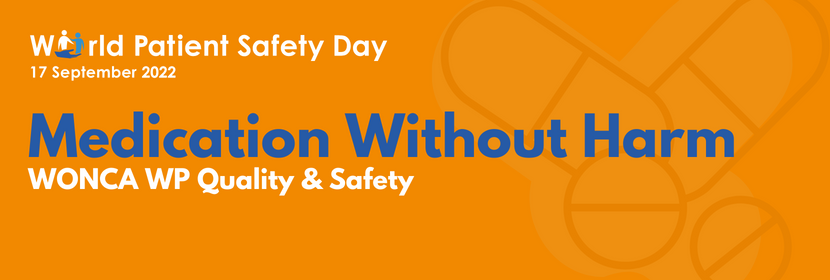WP Quality & Safety: World Patient Safety Day
 Visit our World Patient Safety Day 2022 board on Trello
Special thanks to Professor José M Valderas, Chair of the WONCA Working Party on Quality & Safety, Dr Andrée Rochfort, President of EQuiP, Dr José Miguel Bueno Ortiz, Dr Maria Pilar Astier Peña, Dr Candan Kendir, Dr Oana Bulilete, Dr, Ignacio Ricci Cabello, and Dr Sky Koh Wei Chee
Visit our World Patient Safety Day 2022 board on Trello
Special thanks to Professor José M Valderas, Chair of the WONCA Working Party on Quality & Safety, Dr Andrée Rochfort, President of EQuiP, Dr José Miguel Bueno Ortiz, Dr Maria Pilar Astier Peña, Dr Candan Kendir, Dr Oana Bulilete, Dr, Ignacio Ricci Cabello, and Dr Sky Koh Wei Chee
Dear WONCA Members,
Medications are the most widely utilized interventions in health care: every person around the world can expect to take medications at some point in their life. However, medications can sometimes cause serious harm if incorrectly stored, prescribed, dispensed, or administered. It is therefore not surprising that unsafe medication practices and medication errors are a leading cause of avoidable harm and injury in health care systems globally. The World Health Organisation (WHO) has long cautioned that more than 50% of all medicines are prescribed, dispensed or sold inappropriately and recent findings from the OECD confirm that almost half of all patients receive prescriptions for medication that do not meet their clinical needs. Acknowledging this substantial burden and recognizing the complexity of medication-related harm prevention and reduction, the World Health Organisation (WHO) has identified Medication Without Harm as the theme for the third Global Patient Safety Challenge and made " Medication Safety" the theme for World Patient Safety Day 2022.
On this day we want to join WHO in RAISING global awareness of the high burden of medication-related harm; ADVOCATING urgent action to improve medication safety; ENGAGING all people to participate in the efforts to prevent medication errors and reduce medication-related harm; EMPOWERING patients and families to be actively involved in the safe use of medication and SCALING UP implementation of the WHO Global Patient Safety Challenge: Medication Without Harm.
There is potential for errors to occur at multiple stages of the medication use process. Medication errors may occur when weak systems and/or human factors such as fatigue, poor environmental conditions or staff shortages affect prescribing, transcribing, dispensing, administration and monitoring practices, which can then result in severe harm, disability and even death. Multiple interventions to address the frequency and impact of medication errors have already been developed, yet their implementation is varied.
We need to adopt a systems approach and promote safe medication practices to prevent medication errors and reduce medication-related harm. Special consideration is necessary for areas where most harm occurs. The three key action areas of (1) high-risk situations, (2) transitions of care, and (3) polypharmacy have been identified across the domains of patients and the public, health care professionals, systems and practices of medication, and medicines.
Family Physicians are ideally placed to play a crucial role in all these situations thanks to our unique whole-person life course approach and our role as coordinator of multiple sources of prescribing. The WONCA Working Party on Quality & Safety has also prepared and delivered workshops to support family doctors in improving the quality and safety of their practices in relation to deprescribing.
On this day, please do join us for the World Patient Safety Day 2022 Virtual Event. Among the distinguished presenters, our chairman will make the case for the key role of Family Physicians.
We would like to encourage our fellow WONCA members to lead the way by endorsing this initiative and promoting it locally and through social media, keeping up-to-date with best practices in the area (including relevant WHO Technical Reports). This is part of critically appraising how we can improve our own practices for the benefit of our patients and the wider population.